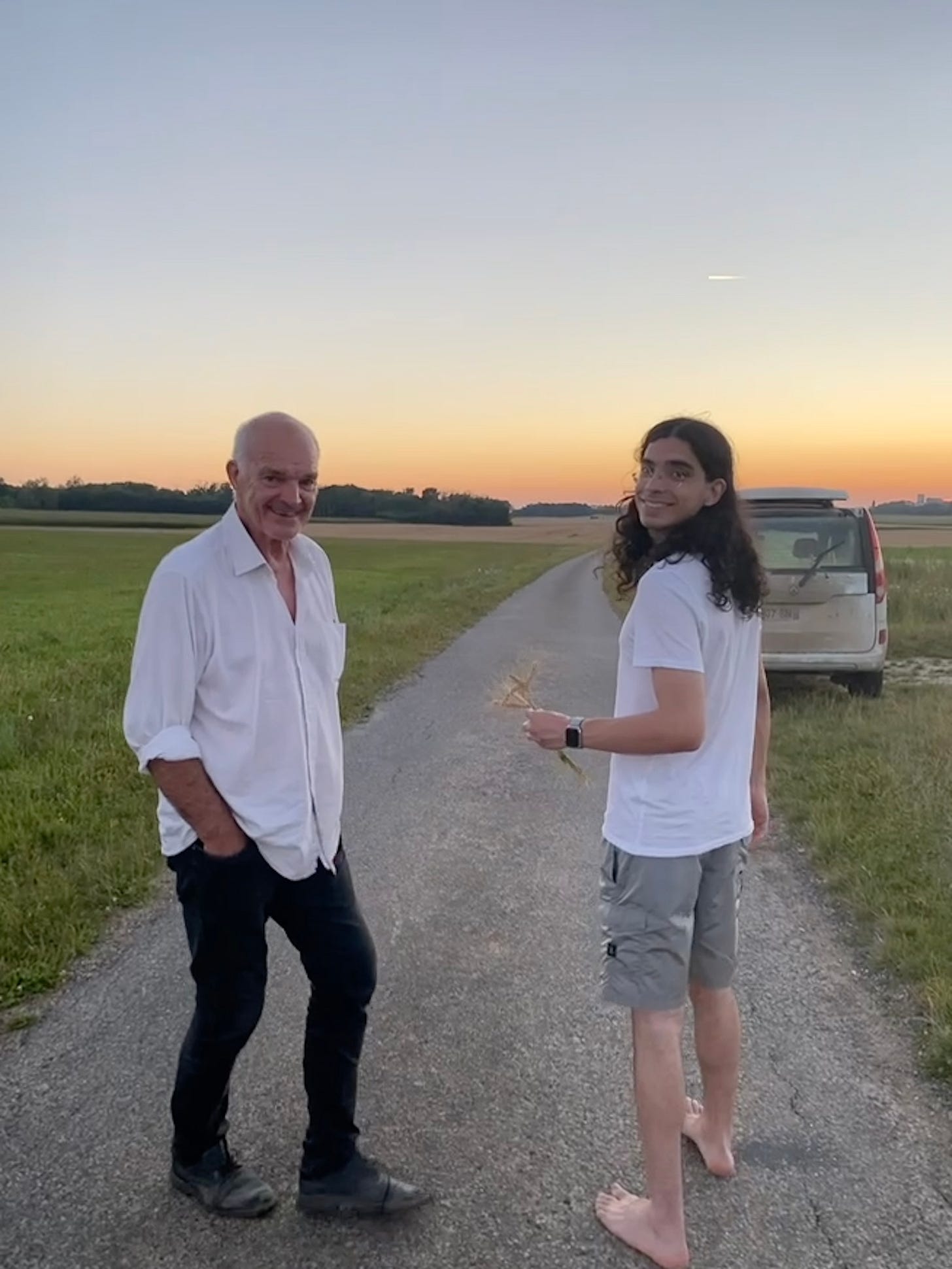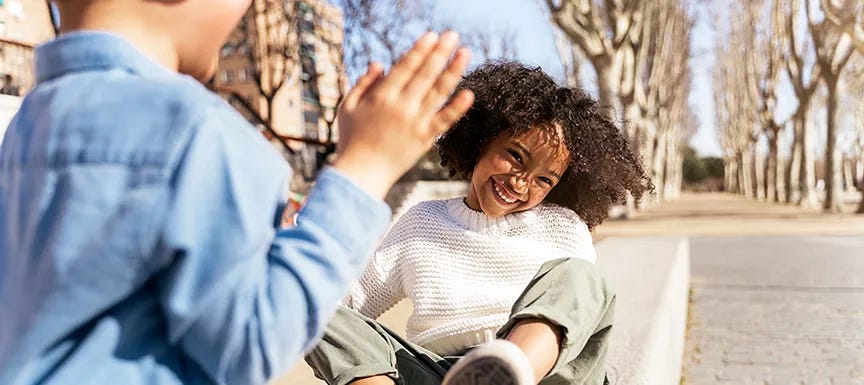How to transform our school system is a challenge that has kept me up at night for the last 8 years.
My interest in the topic has covered various areas. I’ve studied learning how to learn, getting hooked into the science of learning; I then explored social-emotional tools and psychology; and most recently I’ve been discovering what ancestral cultures can teach us about education.
But today, let me share some ideas that came into my thoughts just a week ago, and that profoundly transformed my vision of education.
These ideas came from Sarah Fitz-Claridge’s writings, which led me to interview my friend Jean-Pierre, father of 5 and former school teacher, and Ryan, CEO of Primer.
What do they all have in common? Doing their best to take kids seriously.
Let’s see why this is the most important concept you’ll ever stumble upon when it comes to crafting the future of education.
How we ended up coercing kids
Sarah’s organization, Taking Children Seriously, was born in response to the typical way we educate kids nowadays: by persuading them to do things.
Coercive education is pernicious because it’s subtle. It's also an idea that often goes unnoticed, as it's often justified by "great" educators or "exemplary" parents.
It starts from assuming that we adults know better than kids what is good for them. An apparent harmless statement that rationalizes the use of force (physical AND psychological) on our kids.
Here are some examples of coercive education in action:
Enrolling your kids in hobbies without asking them what they think about it.
Reprimanding them for getting bad grades.
“Suggesting” they eat more vegetables while serving them on their plate.
Asking your child to take the trash out, otherwise they’re not allowed to watch TV tonight.
Telling your kids they have to go to bed, “because there’s school tomorrow”.
If you think that you need to act this way for them to have good grades, eat vegetables, participate in chores, or get enough sleep, you’re the victim of a self-fulfilling prophecy.
“Non-coerced children do not have tantrums; they do not discount the wishes of their parents; they do not steal, lie, commit suicide, intentionally destroy other people’s property, go out alone at 3 a.m. to play in the park, or drink bleach. They do not coerce their parents,” says Sarah.
Your kids are designed to take care of themselves and have an immense sense of empathy. But because you believe they require coercion, you don’t let them develop those skills or teach them to trust themselves.
This posture is problematic for two reasons:
Kids are humans who deserve respect and freedom of opinion, expression, movement, just like anyone else.
We are teaching the next generation of adults to shut down their intuition and rely on others to know what’s best for them.
This is not only happening inside the family but also, of course, at school. It is the root of all the issues that surface in educating kids, therefore, a very important principle.
Be like Jean-Pierre: a model of taking kids seriously
Jean-Pierre has been taking kids seriously for the last 50 years. It all started when he had his first daughter at age 21. With four other kids raised since then and having been the teacher of a mixed-ability class in a small French village, his experience is considerable.
Still, he doesn’t consider himself as an “education expert” and would rather talk about his work as an artist. But if you can get him to talk about education, he’ll tell you that a good education doesn’t follow precepts. Instead, he encourages educators to develop a certain set of skills: a sense of observation, care, respect, nuance and intuition.
Then, “it’s case-by-case treatment,” he says.
We can never stress it enough: there’s no one-size-fits-all type of education, even with the “taking kids seriously” approach! And this is what I really love about it. Based on a fallibilist posture, we work with the assumption that we can always improve our approach to the education of our children or students.
The second takeaway from this discussion: the kids are both your top source of inspiration and your most important feedback providers.
Jean-Pierre comments: “We can be wrong, I’ve been wrong myself many times, but the difference is I always accepted the need to change and think about how to do better.”
This requires the humility to be proven wrong by children and then to adapt to the child’s needs instead of asking them to adapt to your Montessori, Freinet, or whatever model of education you’ve been inspired by.
He also speaks about the importance of “the small things”. EdTech should pay attention to this: we like to think of innovation as big, sensational changes, but oftentimes, a successful transformation lies in the details.
To illustrate it, he shares an example: “I didn’t want my kindergarten students to have to ask me in order to go to the bathroom. When they needed it, they’d just go. No authorization needed. It’s a torture to have to ask to go to the bathroom!” We laughed and I told him that, truth is, lots of teachers wouldn’t only ask you to request it, they’d actually refuse it to you, too.
How have we come so far in coercing kids?
Finally, for Jean-Pierre, taking kids seriously simply means accepting them fully, offering genuine respect and attention to their needs, and loving them unconditionally.
That’s not to insinuate that all parents don’t love their kids deeply, but there’s a kind of love that never makes you doubt your own existence. He speaks about how loving his children without expectations built into each of them a deep quality of trust and gave them the confidence to explore the world as much as needed.
Taking kids seriously at scale: The Primer example
Primer’s ambition is to rebuild childhood education from A to Z. One of their products, Primer Microschools, is the perfect example of how schools can take children seriously, too.
I interviewed Ryan Delk, Primer’s CEO, and Carly Valency, the team’s community builder and here are some takeaways:
i. A system that prepares kids for the real world
One of the biggest issues with our current school system is that it has become a bubble in which children are completely disconnected from how the world really is.
That distance from reality shows a lack of respect toward children. A bit like when we make them believe in Santa Claus, we take advantage of being a figure of authority to decide what is good for them to believe, what they should spend time on, even though much of it is completely disconnected from reality.
Primer takes kids seriously by helping them develop the skills they will need to thrive in real life. They teach them creativity and original thinking, while giving them a solid base in core academics.
ii. Taking teachers seriously, too
The way teachers are treated in the current school system sets the attitude: a general lack of consideration, agency to experiment, and resources makes it difficult for them to treat their students decently.
It was clear for Primer that they had to give the power back to their educators. Their model: help their teachers to open their own microschool, all the way from legal issues to the curriculum, empowering them to build their dream classroom.
It shows the need to reflect on how the structures themselves are sometimes “coercive by design” and how we can transform them into a “Take Kids Seriously” type of culture.
iii. Nourishing the best in children
What if school encouraged autonomy and highlighted ambition in students, instead of chronically underestimating what they’re capable of?
Not only would results skyrock, behavior would change for the better, too.
Ryan puts it like this: “Instead of focusing only on bullying, let’s have a look at what’s causing it: kids with no agency in environments where you get high status by bad behavior.”
It’s once again about the difference between addressing the symptoms or the cause.
At Primer, what’s made most attractive to the kids is to embody curiosity, resilience and kindness. It is modeled by the adults, and this attitude is also encouraged by teaching students social-emotional tools.
Questions to ponder: How do you think coercive education affected you as a kid? How can we heal our coerced minds? Do you sometimes notice yourself coercing others, and if so, what does it look like? I’d love to hear your thoughts, as these will be the topic of a future article.
If you want to learn more about Taking Children Seriously, whether diving into more theory or understanding its daily practice, I recommend reading the blog takingchildrenseriously.com & Sarah’s work in general.
Be a cool future ancestor, stop forcing your children (& yourself!) into doing things they don’t want to do.
Until next week – and let me know what you thought about this one!
Zelda
No matter what, I’m happy you read this one, but also consider subscribing:
I’m Zelda, my mission is to craft words & movements that contribute to the education revolution. I do it in this newsletter, on Twitter, Instagram, and TikTok.






